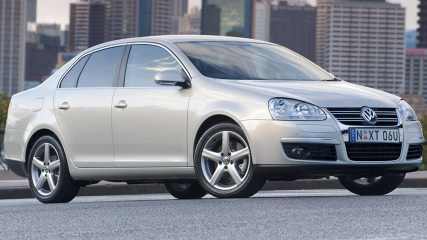Volkswagen Jetta 2010 Review
By Neil Dowling · 12 Apr 2010
In Japan, they shrink trees. In city centres, it's squeezing people together in concrete hutches. In the car world, it's downsizing engine capacity. But while you're aware that the trees are small enough to sit on the coffee table and that the apartment is small because it has only room for a coffee table, the trick about downsizing cars is that you'd be hard pressed to pick the difference.Welcome to the next phase in car makers' task of weaning us off big cars. Within a decade, you may be driving a two or three-cylinder car and, probably, finally understanding why Fiat Bambinos made so much sense in the 1960s for financially-strapped Italians. Volkswagen is thinking small to gain energy efficiencies but you'd never pick it.Engine and gearboxAmong its new small-capacity models is the Jetta 118TSI. The gobbledygook is 118kW and the TSI indicates it is both supercharged and turbocharged. That is, the supercharger works from idle through to about 3500rpm when the turbocharger takes over. You get punch from idle right through to the red line without even knowning what's happening under the bonnet.The boot wears a 118TSI badge but one thing it doesn't tell you is the engine capacity. Maybe you don't need to know. Certainly, in performance terms it feels like a 2-litre, maybe a 2.2. It's quick off the mark and the seven-speed automatic direct-shift gearbox (DSG) flicks from ratio to ratio like a card shark dealing a hand.You can play along as well because the box is sequential and the gearlever can be shuffled forwards and backwards to maximise performance. But, after a short time, you recognise that the gearbox can do the job just as well as you and with a lot less effort on your behalf.The engine is hungry to offer performance, free in the way it wants to rev and seamless in its power delivery that starts from idle and wants to go straight into 7000rpm. Watch the trip computer and you'll notice that only when you savage the accelerator does the fuel consumption numbers increase. Take it easy or cruise the highway and the Jetta will deliver 6s and 7s in the litres/100km readout.Body and spaceThat consumption is really good considering that though the Jetta is basically a Golf with a boot, it has a stupendous cargo-carrying ability. The boot is huge - bigger than a Commodore apparently - and has a full-size spare tyre beneath the floor. The rear seats split and fold down to boost luggage room. And it's not shy when carting people either, able to haul five adults - though four is preferred - with good leg and headroom.DrivingRide quality leans towards firm but the dampening doesn't jar occupants and the kiddies won't be upset - any more than they usually are. Volkswagen offer a sports suspension on other Jetta models that further tightens the suspension but, honestly, you don't need it. Handling is superb. Like the Golf, the Jetta makes the driver feel instantly at home. The seating position - with height adjustment - and the tilt-telescopic steering wheel fits all sizes. But it's also the way it drives. The Jetta sits confidently on the tarmac with excellent steering feel and strong - almost abrupt - brakes.It will corner hard and fast before giving way to understeer and should surprise many drivers used to more exotic machinery. It just feels right. The icing is the drivetrain. The engine is revvy and the DSG box is very responsive. There are times when the box can be too responsive. It's not always smooth on take off, with a bump from the box as all the oily bits connect, and a sudden prod on the accelerator pedal will show some indecision. But that's at odds with the way it smoothly slides up and down the seven cogs when in motion.Pricing and equipmentThe Jetta comes in five models and this, the 118TSI, is the cheapest petrol model starting at $30,990 as a manual. As tested, with all the fruit - and believe me, it's very well equipped - it costs $33,490 plus on-road costs. Cabin treatment is clinically German with switchgear that works very well and set into an attractive dashboard that reflects high build quality.I recognise that lockable gloveboxes aren't necessarily a deterrent to thieves but I appreciate that an owner can store personal items with some peace of mind.Features include front and rear parking sensors, eight-speaker iPod/MP3 audio with single CD player, cruise control, trip computer and a climate-control dual-zone airconditioner with pollen filter. More important is the standard seven airbags, stability control, tyre pressure warning and five-star crash rating.I forgot two things: This is a well-designed yet somewhat indescript sedan. You will love the way it works but compared with a Mazda3, for example, is as flashy as a cardboard box. The second thing is the engine size. Not that it matters but it's a puny 1.4 litres. Drive this thing and you'd never believe it's this small. In Germany, they shrink engines.VOLKSWAGEN JETTA 118TSI DSGFEATURES: Dual-zone climate aircon; 8-speaker iPod/CD audio; 7 airbags; park sensors; cruise controlOrigin: MexicoPrice: $33,490Engine: 1.4-litre, 4-cyl, supercharger, turbochargerPower: 118kW @ 5800rpmTorque: 240Nm @ 1500-4500rpm0-100km/h: 8.5 secondsFuel: Premium unleadedFuel tank: 55 litresEconomy: official 6.6 litres/100km; tested 7.2 litres/100kmGreenhouse: 153g/km (Corolla: 175g/km)Transmission: 7-speed DSG automatic, sequential; front-driveBrakes: 4-wheel discs, ESC, ABS, EBD, brake assist, hill start assistTurning circle: 10.9mSuspension: Front - MacPherson struts; Rear - multi-link, coilsWheels: 16-inch alloy, 205/55R16 tyres; full-size spareLength: 4554mm Width: 1781mm Height: 1459mmWheelbase: 2578mm Weight: 1406kgTow (max): 1400kgWarranty: 3yr/100,000km, roadside assistService: 15,000kmRATING: 88/100RIVALS: Honda Accord Euro ($35,490) - 85/100Mazda3 SP25 ($31,920) - 87/100Toyota Corolla Ultima ($30,690) - 83/100



